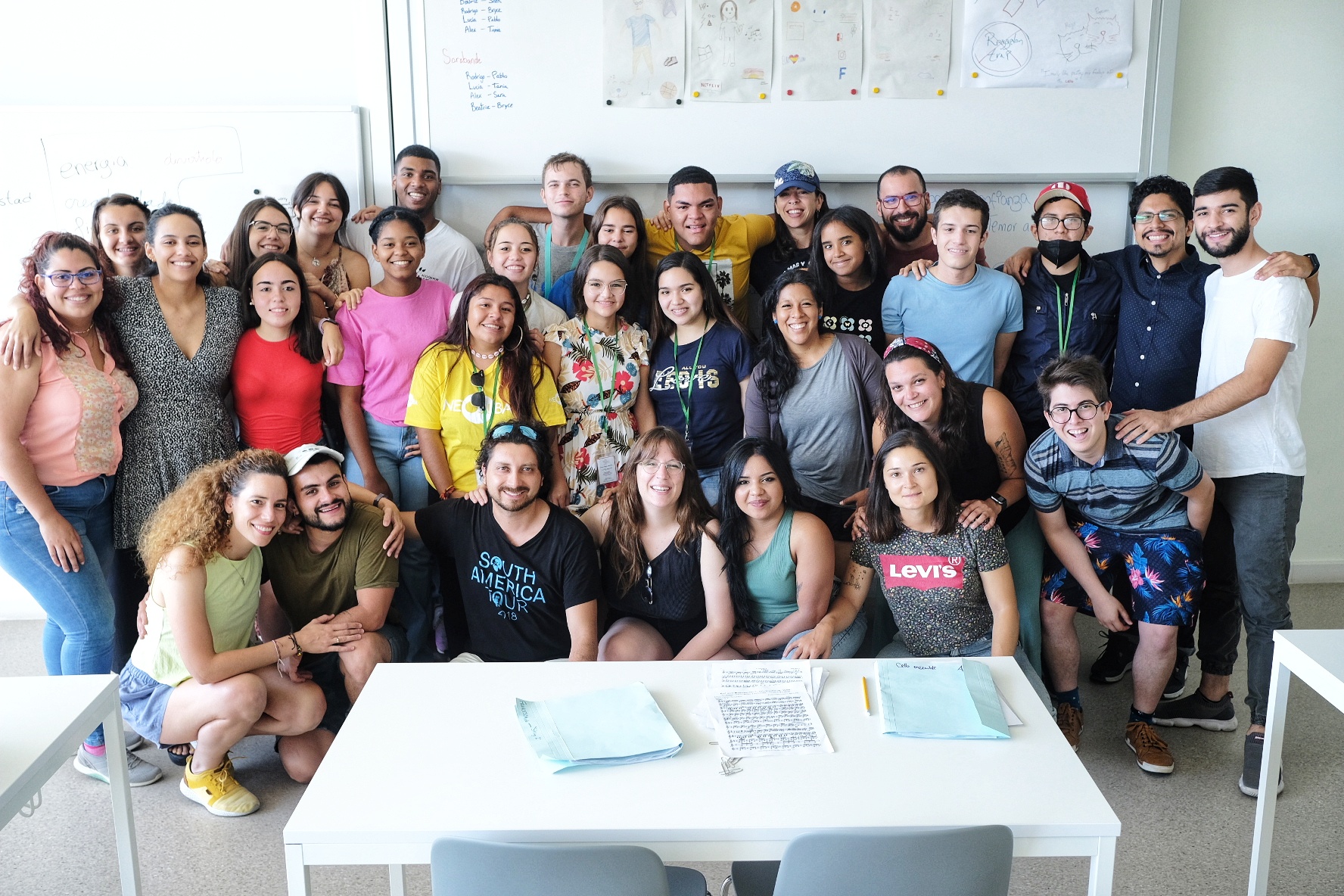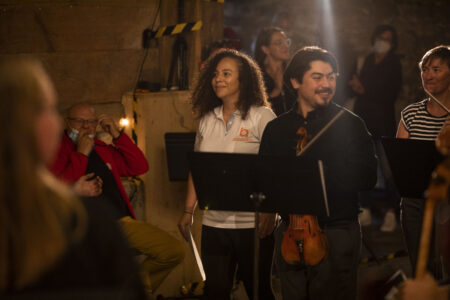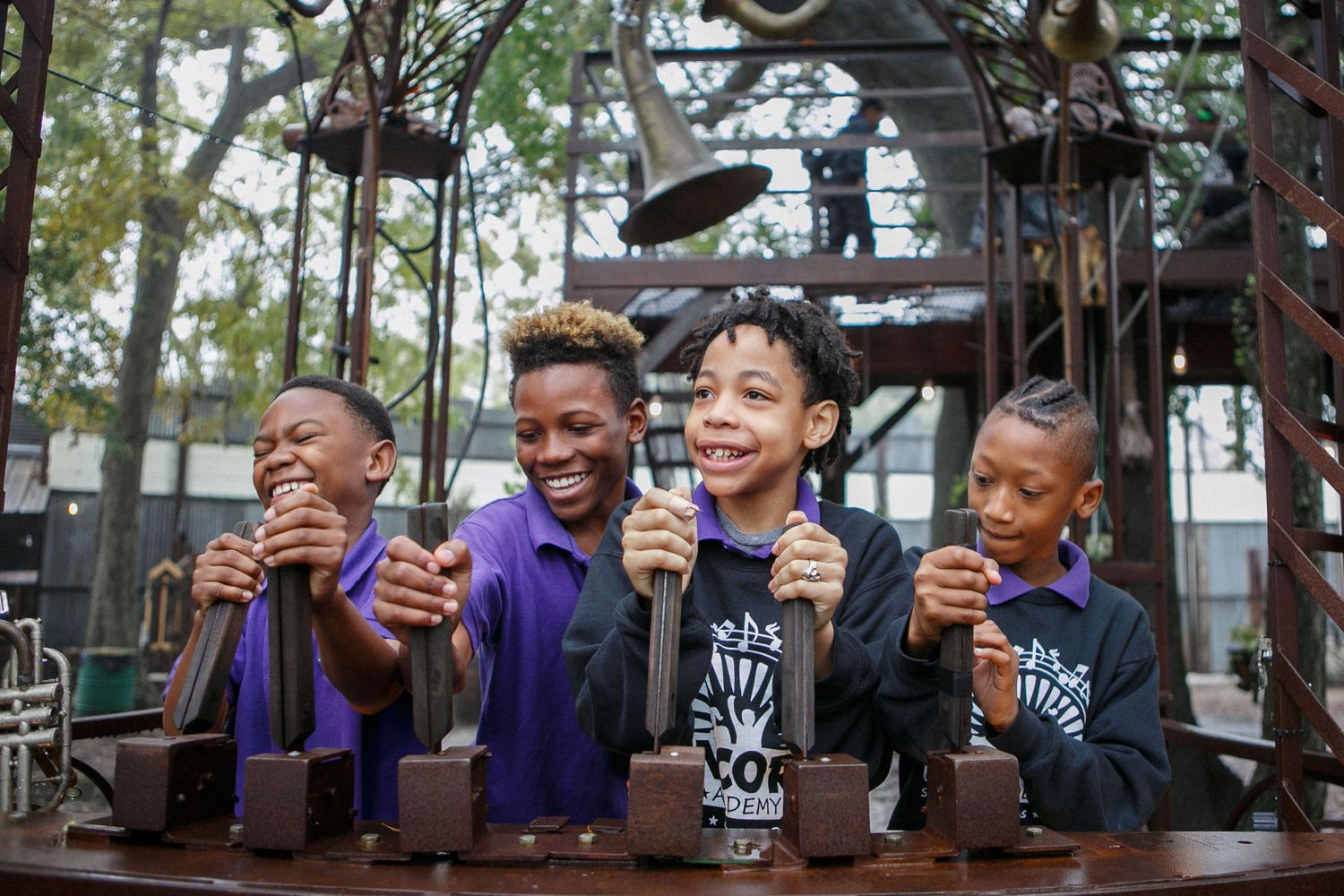
Growing AIM’s Firebird Fellowship into an Alumni Program

Pablo Silva (front row, black shirt) of Teatro del Lago with some of his Firebird cohort.
“Your alumni will become your best assets for your mission.” That’s what social entrepreneurs from Changemaker Fellowships told AIM’s leadership when we began in 2018. So far, we agree.
The mission of AIM (The Academy for Impact Through Music) is to tackle educational inequality through intensive ensemble music education. We’ve developed a set of five pedagogical principles that guide our work: once called the Pillars, these principles are now called our Destinations, to capture the sense of navigating toward student outcomes in everything we do.
As an international organization, we have developed a 15-month fellowship, the “Firebird” Fellowship, for teaching artists in music for social impact programs on four continents. With the help of coaches and peers, Firebird Fellows advance their practice through experimentation, curriculum exploration, and collegial discovery.
AIM has evolved by learning through experience, and when we reached the point of 100 graduates, we felt the truth of that initial advice from the Changemaker entrepreneurs. So we launched an Alumni Program, realizing that our alumni will comprise and lead the community of intrinsically-motivated sharers and advancers of our mission. As they rise in leadership, designing student-centered learning journeys, creating better systems and programs, and advocating at the level of policy, we hope they will become generous teachers and exemplars of the next generation, in and beyond their music programs.
We’ve designed our Alumni Program by harnessing the insights and expertise of the alumni themselves. We’ve learned along with them. One thing we’ve all learned is that 15 months may be enough to begin a transformational process—but the work we do, as educators, coaches, mentors, and facilitators, involves many higher-order cognitive skills that need time to ripen and manifest in teaching practice.
For example, one does not learn to critically observe a learning environment, or to analyze the effectiveness of teaching choices observed on video, within a week. The “simple” act of discerning impact while observing a lesson is a craft that takes careful cultivation. Our Firebirds do change their teaching practices through careful experimentation; even more important, they develop new habits of mind, new ways of documenting impact, and creative approaches to achieving new life possibilities for young people.

The Alumni Program has two main parts. The first part, which we call “shallow and wide,” is all about creating a network by offering open sessions, office hours, and drop-ins, spaces where alums can connect to their community and learn from one another, from AIM leaders, and from the wider field. Concurrently, for the second part (“narrow and deep”), we’re working more closely with a lead group of alumni who are in a position to expand their impact on students, whether through AIM or at their programs.
I recently conducted written interviews with four actively engaged AIM alumni to find out more about their alumni experience. Each alum has found a particular strand of AIM’s teaching to be their most motivating pathway for experimentation.

For example, Raphael Elias (from NEOJIBA, in Brazil) says, “The most important learning I brought from the Fellowship is understanding the importance of metacognition in the learning process. In a world of constant bombardment by often superficial information, it’s essential to cultivate a mindset that goes beyond simple data absorption. A metacognitive perspective empowers students to reflect on their own learning process and to develop lasting skills such as critical thinking, creativity, and problem-solving.”
Natalí Espinosa (from Iberacademy, in Colombia) says, “I began to ask myself if there were other possible ways of doing things. Leaving prejudice behind was fundamental. We have consciously implemented AIM principles in our daily lives … to the point that in this new cohort, two people from my work team are part of the group of new Firebirds.” Natalí has become the head of culture in her hometown of Guarne.

Erika Gómez (Sinfonía por el Perú) sees her future in advancing the work of other teaching artists: “Although there are still teachers who are firmly rooted in traditional pedagogy, what I’ve gained from AIM allows me to help them reflect on their teaching, seek new teaching strategies, and find deeper objectives for their students.”
Several alums note the importance of prioritizing holistic development. As Pablo Silva (from Chile’s Teatro del Lago) puts it: “I now have a way of seeing the world of learning from a holistic perspective, a model of human development that is more adapted to our current needs.”
Pablo and others have ambitious dreams for AIM’s future. “AIM should be everywhere,” he says, “and should have ‘headquarters’ in each region. In Latin America, it would be ideal to achieve the long-awaited ‘AIM LATAM,’ where all the programs of our continent can converge and work together—and where we can be a reference for the world, as a transformative place for society.” He cites the example of the Latin American Orchestra Academy project, a program he has been developing for two years. “It has truly had a ripple effect.”
All four alums envision themselves contributing to a brighter future for the whole field by developing as change-makers. “I envision a future,” says Raphael, “where AIM consolidates itself as a global reference in educational innovation, promoting an integrated and holistic approach to music and arts in education.”
Adds Pablo: “I feel part of a movement that continues over time and creates projects together, because we now have a common language and are working toward the same objectives.”
Related Content
All Regions, Community Building, Editorials, Gather Together, Opinion, Perspectives & Collective Action, Professional Development, Program Design, Student Voice & Leadership, Teaching & Learning, the ensemble
EDITORIAL
Musical Benchmarks Build Equity
Patrick Scafidi
All Regions, Collaborations, Community Building, Events/Performances, Gather Together, News and Resources, North America, Professional Development
New ESUSA Opportunities & Events
Patrick Scafidi
Collaborations, Community Building, Europe, Events/Performances, Funding & Support, Gather Together, Middle East, News and Resources, Professional Development
Funding Opportunity for Arab Artists Based in Europe
Patrick Scafidi
Collaborations, Community Building, Featured, Gather Together, New Orleans, North America, Perspectives & Collective Action, Student Voice & Leadership

The Importance of Free Play in Music Education
Patrick Scafidi


